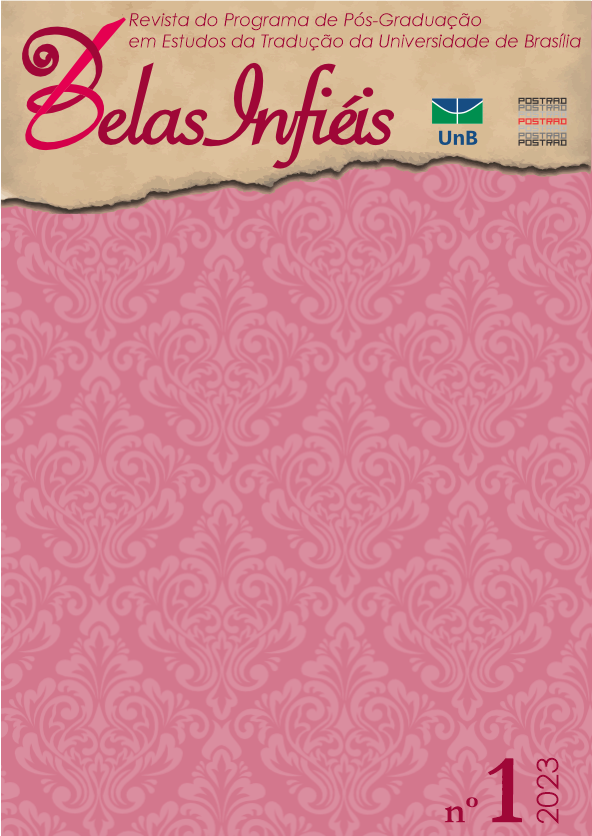Traduzindo o generic “man”: um estudo de caso das duas traduções alemãs dos provérbios em No Longer at Ease, de Achebe
DOI:
https://doi.org/10.26512/belasinfieis.v12.n1.2023.46713Palavras-chave:
homem genérico; tradução; alemão; provérbios; No Longer at Ease.Resumo
Pesquisas realizadas anteriormente sobre a tradução de provérbios têm abordado técnicas e estratégias de tradução de provérbios e outras temáticas, como cultura e literatura oral. No entanto, muito pouco foi feito sobre o tema da tradução relacionada a questões de gênero nos provérbios africanos e as implicações disso em transferências para outro idioma, especialmente para o alemão. O presente estudo visa examinar alguns provérbios encontrados em No Longer at Ease (1960), de Chinua Achebe, com o objetivo de mostrar como o uso da palavra “man” [“homem”] nesses provérbios levou a uma tradução com viés de gênero da palavra nos dois textos que tiveram o alemão como língua-alvo. A abordagem conceitual usada é a hipótese da relatividade linguística de Sapir-Whorf. Descobriu-se que a palavra genérica “man”, usada pelo autor nos provérbios, é traduzida, nos dois textos-alvo em alemão, pela palavra específica relacionada ao gênero masculino, “ein Mann”, o que torna as mulheres menos visíveis como referentes.
Downloads
Referências
Achebe, C. (1960; 2008). No Longer at Ease. Heinemann.
Achebe, C. (1963). Obi. Ein Afrikanischer Roman (J. Tichy, Trans.). F. A. Brockhaus.
Achebe, C. (2002). Heimkehr in fremdes Land (S. Koehler, Trans.). Suhrkamp Verlag.
Baron, D. (1986). Grammar and Gender. Yale University Press.
Duden. (n.d.). Mann. In Dudenonline. Retrieved 02/01/2023 from https://www.duden.de/suchen/dudenonline/Mann
Duden. (n.d.). Mensch. In Dudenonline. Retrieved 02/01/2023 from https://www.duden.de/suchen/dudenonline/Mensch
Formanowicz, M., Cislak, A., Bedynska, S., & Sczesny, S. (2013). Side Effects of Gender-Fair Language: How Feminine Job Titles Influence the Evaluation of Female Applicants. European Journal of Social Psychology, 1–11. doi: 10.1002/ejsp.1924
Garnham, A., Sarrasin, O., Gabriel, U., & Gygax, P. (2012). Gender Representation in Different Languages and Grammatical Marking on Pronouns: When Beauticians, Musicians, and Mechanics Remain Men. Discourse Processes, 49(6), 481–500. doi: 10.1080/0163853X.2012.688184
Gast, V. (2012). Human impersonal pronouns in English, Dutch and German. Leuvensche Bijdragen, 1–38.
Hamilton, M. & Hunter, B. (1992). Jury Instructions Worded in the Masculine generic: Can a Woman Claim Self-Defense when ‘he’ is Threatened? In J. Chrisler & D. Howard (Eds.), New Directions in Feminist Psychology: Practice, Theory and Research (pp. 169–178). Springer.
Hyde, J. (1984). Children’s Understanding of Sexist Language. Developmental Psychology, 20, 697–706.
Ikegwuonu, C. (2019). An Exploration of Gender System in Igbo Language. Open Journal of Modern Linguistics, 9, 245–253.
Iwamoto, N. (2005). The Role of Language in Advancing Nationalism. Bulletin of the Institute of Humanities, 38, 91–113.
Luck, C. (2020). Rewriting Language: How Literary Texts Can Promote Inclusive Language Use. University College London.
MacKay, D., & Fulkerson, D. (1979). On the Comprehension and Production of Pronouns. Journal of Verbal Learning and Verbal Behaviour, 18, 661–673.
Mahadi, T., & Jafari, S. (2012). Language and Culture. International Journal of Humanities and Social Science, 2(17), 230–235.
Malamud, S. (2012). Impersonal indexicals: one, you, man, and du. The Journal of Comparative Germanic Linguistics, Springer: 15(1), 1–48. https://www.jstor.org/stable/43549654
Meier, R., & Pinker, S. (1995). The Language Instinct: How the Mind Creates Language. Language, 71(3), 610–620. https://doi.org/10.2307/416234
Moulton J., Robinson, G., & Elias, C. (1978). Sex bias in Language use “Neutral” pronouns that aren’t. American Psychologist, 33, 1002–1036.
Sapir, E. (1956). Language, Culture and Personality (D. G. Mandelbaum, Ed.). University of California.
Stahlberg, D., & Sczesny, S. (2001). Effekte des generischen Maskulinums und alternativer Sprachformenauf den gedanklichen Einbezug von Frauen. Psychologische Rundschau, 52(3), 131–140. doi: 10.1026//0033-3042.52.3.131
Stahlberg, D., Braun, F., Irmen, L., & Sczesny, S. (2011). Representation of the sexes in language. In K. Fiedler (Ed.), Social Communication (pp. 163–187). Psychology Press.
Truan, N. (2018). Generisch, unpersönlich, indefinit? Die Pronomina man, on, one und generisches you im politischen Diskurs. In L. Gautier, P.-Y. Modicom, & H. Vinckel-Roisin (Eds.),Diskursive Verfestigungen Book Subtitle: Schnittstellen zwischen Morphosyntax, Phraseologie und Pragmatik im Deutschen und im Sprachvergleich (pp. 347 – 364). De Gruyter. https://www.jstor.org/stable/j.ctvbj7k9m.24.
Uwasomba, C. (2007). A Feminist Reading Of Chinua Achebe’s Things Fall Apart. The African Symposium, Online Journal of African Educational Research Network, 7(2), 19–26.
Whorf, B. (1956). Language, Thought and Reality (J. Carroll, Ed.). Mass MIT Press.
Downloads
Publicado
Como Citar
Edição
Seção
Licença
Copyright (c) 2023 CC BY

Este trabalho está licenciado sob uma licença Creative Commons Attribution 4.0 International License.
Dado ao acesso público desta revista, os textos são de uso gratuito, com obrigatoriedade de reconhecimento da autoria original e da publicação inicial nesta revista
A revista permitirá o uso dos trabalhos publicados para fins não comerciais, incluindo direito de enviar o trabalho para bases de dados de acesso público. As contribuições publicadas são de total e exclusiva responsabilidade dos autores.
Os autores, ao submeterem trabalhos para serem avaliados pela revista Belas Infiéis, mantêm os direitos autorais e concedem à revista o direito de primeira publicação, sendo o trabalho licenciado sob a Creative Commons Attribution License Atribuição 4.0 Internacional (CC BY 4.0).



















